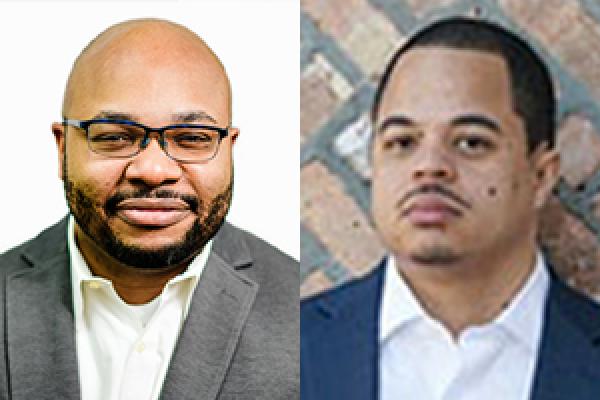
Event Host: 1619 and Beyond Program, Department of History
Short Description: Please join the 1619 and Beyond Program for a lecture by Shannon King, associate professor of history at Fairfield University, and Carl Suddler, associate professor of history at Emory University.
Please join the 1619 and Beyond Program for a lecture by Shannon King, associate professor of history at Fairfield University, and Carl Suddler, associate professor of history at Emory University.
Shannon King is the author of Whose Harlem Is This, Anyway?: Community Politics and Grassroots Activism during the New Negro Era. His research and teaching interests include African American urban and cultural history, black freedom studies and criminal justice and carceral studies. His work has been published in the Journal of Urban History and History: Review of Books and awarded a residency at the Schomburg Center for Research in Black Culture. He is working on a book manuscript on race, crime and punishment in New York City during the 1930s and 40s, tentatively titled Policing the Crisis: Black Protest and Law and Order in New York City during the Riot Era.
Carl Suddler is an African American historian whose research interests lie at the intersections of youth, race and crime. Suddler’s scholarship is committed to developing better understandings of the consequences of inequity in the United States. His research and teaching interests are related to 20th century U.S. history, African American urban history, histories of crime and punishment, the carceral state, sport history and histories of childhood and youth. Suddler’s first book, Presumed Criminal: Black Youth and the Justice System in Postwar New York, points to a critical shift in the carceral turn between the 1930s and 1960s when state responses to juvenile delinquency increasingly criminalized black youths and tethered their lives to a justice system that became less rehabilitative and more punitive. His other works have also appeared in scholarly and popular outlets such as the Journal of American History, Journal of African American History, American Studies Journal, as well as op-eds for the Washington Post, The Conversation and Bleacher Report. Suddler earned his B.A. in history and Black American studies from the University of Delaware and his Ph.D. in history from Indiana University, Bloomington. Prior to his appointment at Emory, he was an assistant professor of history at Florida Atlantic University and a postdoctoral fellow at the James Weldon Johnson Institute for the Study of Race and Difference at Emory.
To learn more and register, visit the Center for Historical Research (CHR) website. Registration links will be posted on the CHR calendar within six weeks of the event.
If you have questions or require an accommodation such as live captioning or interpretation to participate in this event, please indicate contact CHR Director John Brooke. Requests made 10 days prior to the event will generally allow us to provide seamless access, but the university will make every effort to meet requests made after this date.
About the 1619 and Beyond Program: In late August 1619 “twenty and odd” Angolans were brought from the West Indies to the Chesapeake Bay on the ship White Lion. Some of these individuals were sold into slavery at Jamestown. 2019 marked the quadricentennial of this arrival of Africans in British North America and the start of a trans-Atlantic slave trade that would continue (legally and illegally) until the Civil War, with profound legacies running to the present.
During this, the second year of our lecture series, The Ohio State University will move from last year’s focus on the slavery era to a year-long program examining the legacies of slavery in American and African American life from the post-emancipation period (after the Civil War) to the present time. This year, the series will feature invited lectures by eminent scholars of the Jim Crow Era, the Modern Civil Rights Movement/Era, and the contemporary issues that continue to reflect a need to address the legacies of centuries of legal, race-based enslavement, segregation and discrimination. The program will also offer film screenings, seminars and Slavery Roundtables. The departments urge students to participate in these events and to take courses dedicated to the history of slavery.
